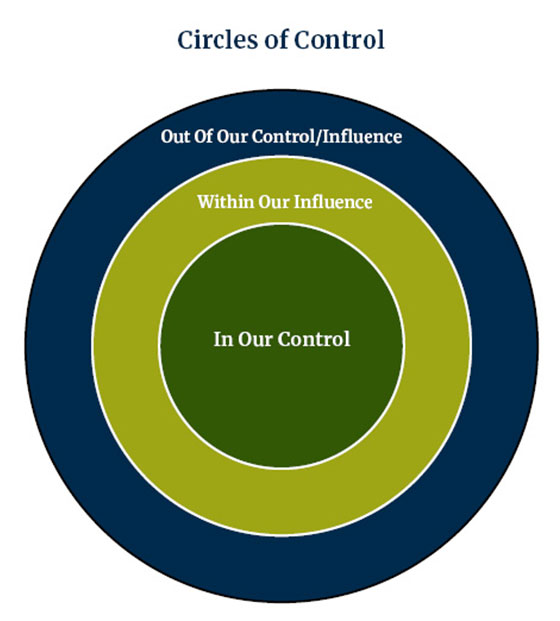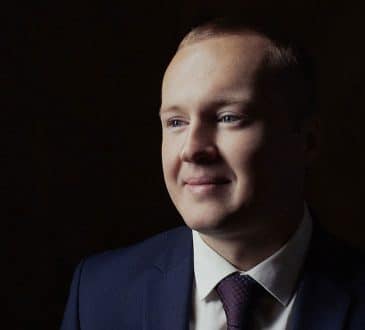Feeling Out of Control? Focus on Building Your Resiliency

As the uncertainties and challenges of the COVID-19 pandemic continue, many individuals are feeling an unfamiliar anxiety. Loss of control is leading to depression, confusion and low motivation. Leaders especially carry a heavy burden right now. More than ever, they must reassure employees and keep teams stable, all while dealing with their own anxieties.
Stephen Covey’s The 7 Habits of Highly Effective People provides various concepts that can be used during times of uncertainty. In his book, he introduces the idea of the “Circle of Influence,” a method for gaining clarity and focusing on what is actually in our control versus what is not.
Leaders can use a simple rendition of the tool (see image) to organize everything on their minds. By placing topics in the three distinct circles of control, leaders can quickly prioritize what is important and requires action. More often than not, individuals who complete this exercise realize that they spend a great deal of time worrying about and acting on items outside their control or influence.
By redirecting attention and efforts to items within their control, leaders (and everyone else) will have a better chance of success and mitigate the negative effects of uncertainty. In researching my own book, Leading Without Fear, it became obvious that when we can focus on what is within our control, letting go of what is not, we minimize fear, anxiety and worry. As a result, we build resiliency and emotional intelligence – critical skills to successfully weather times of uncertainty and crisis.
In short, resiliency is a life vest that prevents us from drowning. Thankfully, resiliency is also something we can consciously build. Here’s how to attack it from multiple vantage points:
- Physical Resilience requires you to take care of your physical health and well-being. Beyond eating healthy, getting enough sleep and regularly exercising, you can cultivate physical resiliency by taking time for yourself. Don’t forget that breaks and doing things you enjoy are necessary for rejuvenation. Give yourself permission to focus on your physical health needs. Build breaks into your calendar or take a short local road trip to clear your head.
- Mental Resilience is about ensuring continued discipline and boldly accepting new challenges. I hear many describe their current life situation as similar to the movie Groundhog Day – they wake up to the same routine over and over … and over. While it may seem counter-intuitive, growing your mental resilience may require you to take on new challenges and step outside your comfort zone. To build mental resilience, cultivate what psychologists talk about the 4 C’s of mental strength. These are:
– Control. This requires us to dig deeper for what we actually do have control over (see Circles of Control exercise above). While it’s common to worry too much over what we don’t have control over, the opposite is also true: We often forget to include our purpose, our emotions, or the creation of possibilities in the list of what we can control.
– Commitment. Mental resiliency requires us to set clear, distinct goals and consistently work toward achieving them. If you’re feeling bored or unmotivated, stepping out of the mundane and setting some hard, exciting goals may just be what you need to feel reinvigorated.
– Challenge. This requires you to be driven and adaptable. Changing your story around your experience can make all the difference. Are you falling victim to your situation, or can you step into the challenge and use it as an opportunity to cultivate greater mental health?
– Confidence. To be successful, you must believe in your ability to manage your situation. In the coaching world, we embrace the perspective that everyone is resourceful, capable and whole. If you believe that about yourself and others, you can more easily embrace challenges and shed the impulse to rescue those around you. - Emotional Resilience centers around the ability to integrate and manage your emotions. If your emotions are driving the bus, versus the other way around, fear, anger, sadness or guilt can easily trip you up in the face of struggles.
To cultivate emotional resilience, you must work on establishing strong and healthy boundaries. When you are feeling triggered by someone or if something “sets you off,” it can be a sign that you need to establish different or stronger boundaries. An example of a work boundary might be shutting off your computer and email at a certain time in order to respect your personal needs. - Social Resilience is about connection to others. While each of us has differing needs for connection, the key question here is whether you’re supported by family, friends and coworkers in a way that fosters connection. Having close friends with whom you can discuss events in your life or having a network to lean on during challenging times helps build social resiliency. Gallup’s employee engagement survey asks a critical question: Do you have a best friend at work? This question is highly intentional, based on research showing that engagement in our work and life improve if we have social support in the workplace.
One of the few things guaranteed in life is that there will be times of trouble. Cultivating resiliency takes deliberate effort and commitment, but it’s well worth it and will serve you through life’s many ups and downs.
Commentary by Dr. Laurie Cure. Here’s what you’ve missed?
World’s Most Forested Countries.
World’s Most Trendiest Countries.
World’s Best Countries To Invest In Or Do Business.
Bring the best of the CEOWORLD magazine's global journalism to audiences in the United States and around the world. - Add CEOWORLD magazine to your Google News feed.
Follow CEOWORLD magazine headlines on: Google News, LinkedIn, Twitter, and Facebook.
Copyright 2025 The CEOWORLD magazine. All rights reserved. This material (and any extract from it) must not be copied, redistributed or placed on any website, without CEOWORLD magazine' prior written consent. For media queries, please contact: info@ceoworld.biz









